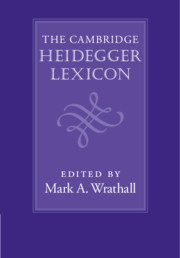Book contents
- The Cambridge Heidegger Lexicon
- Series page
- The Cambridge Heidegger Lexicon
- Copyright page
- Contents
- Contributors
- Preface
- Acknowledgments
- Using the Lexicon
- Chronology of Martin Heidegger
- Abbreviations for Heidegger’s Works
- A
- B
- C
- D
- E
- F
- G
- H
- I
- J
- K
- L
- 121. Language (Sprache)
- 122. Leap (Springen)
- 123. Leveling (Einebnen and Nivellieren)
- 124. Life (Leben)
- 125. Lingering (Weilen)
- 126. Lived Body (Leib)
- 127. Lived Experience (Erlebnis)
- 128. Logic (Logik)
- M
- N
- O
- P
- R
- S
- T
- U
- V
- W
- German–English Glossary
- Bibliography
- Index
122. - Leap (Springen)
from L
Published online by Cambridge University Press: 17 April 2021
- The Cambridge Heidegger Lexicon
- Series page
- The Cambridge Heidegger Lexicon
- Copyright page
- Contents
- Contributors
- Preface
- Acknowledgments
- Using the Lexicon
- Chronology of Martin Heidegger
- Abbreviations for Heidegger’s Works
- A
- B
- C
- D
- E
- F
- G
- H
- I
- J
- K
- L
- 121. Language (Sprache)
- 122. Leap (Springen)
- 123. Leveling (Einebnen and Nivellieren)
- 124. Life (Leben)
- 125. Lingering (Weilen)
- 126. Lived Body (Leib)
- 127. Lived Experience (Erlebnis)
- 128. Logic (Logik)
- M
- N
- O
- P
- R
- S
- T
- U
- V
- W
- German–English Glossary
- Bibliography
- Index
Summary
“Leap” names either (1) the process or event by which something springs from (entspringt) an origin (Ursprung) or source, or (2) the transition to a new condition that is incalculable or unpredictable in terms of the old.
- Type
- Chapter
- Information
- The Cambridge Heidegger Lexicon , pp. 454 - 457Publisher: Cambridge University PressPrint publication year: 2021

